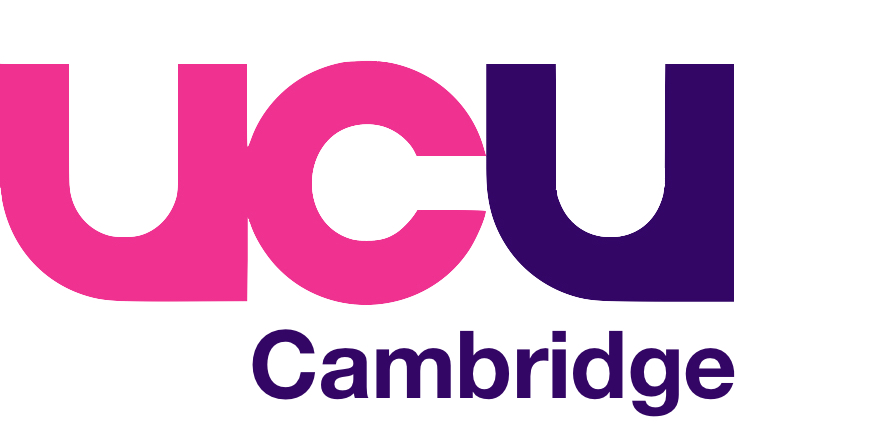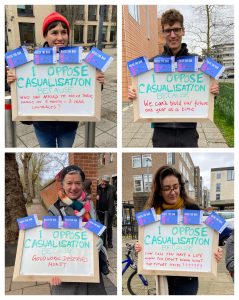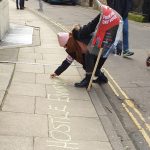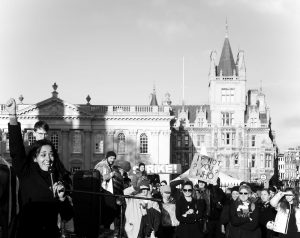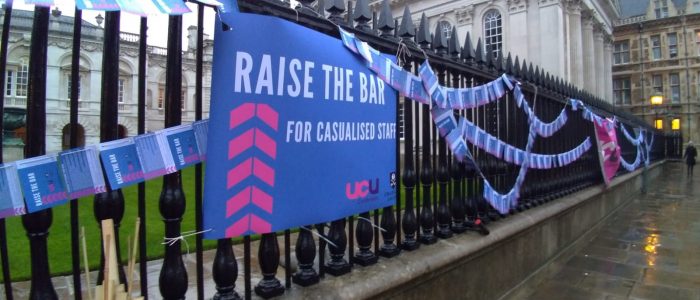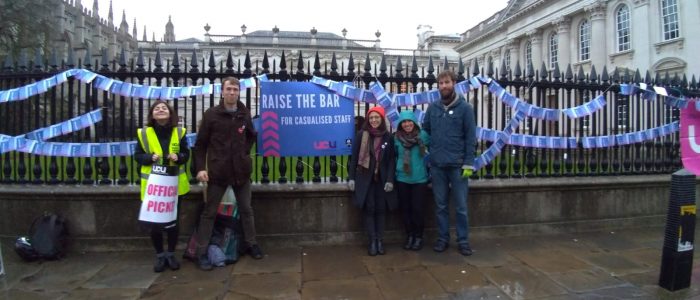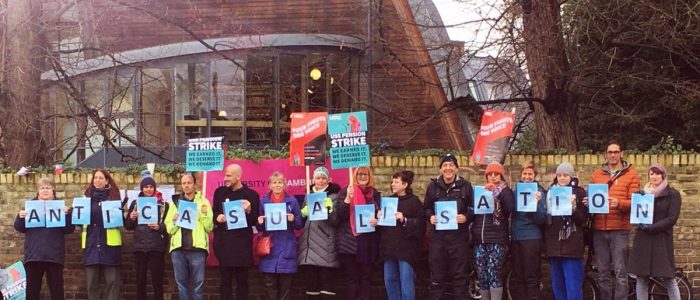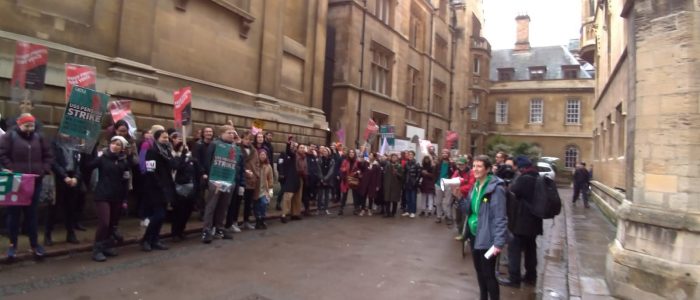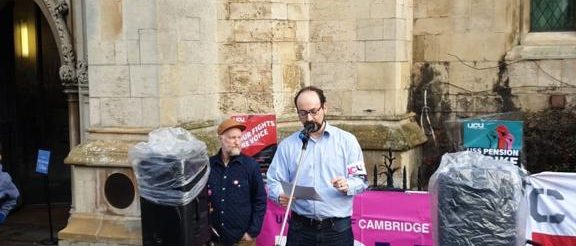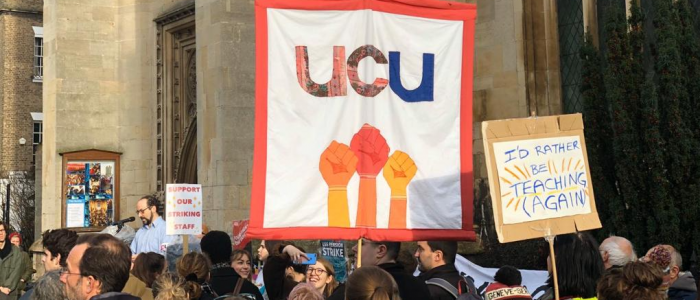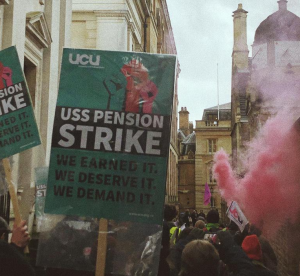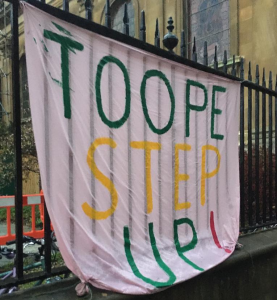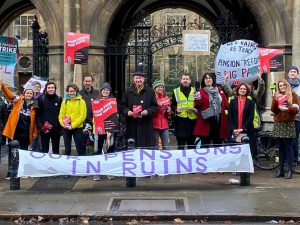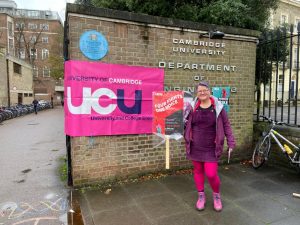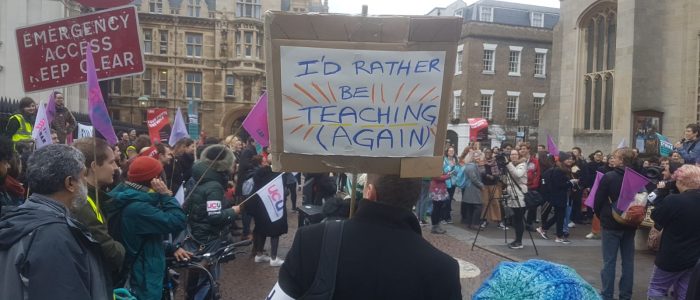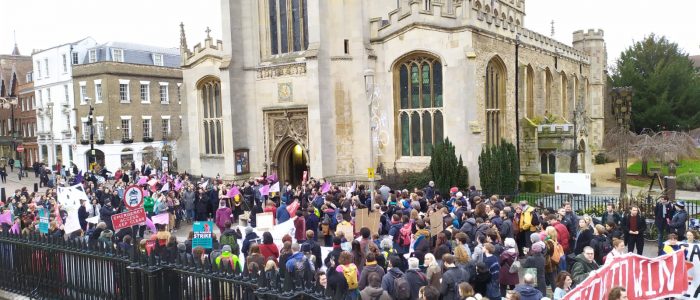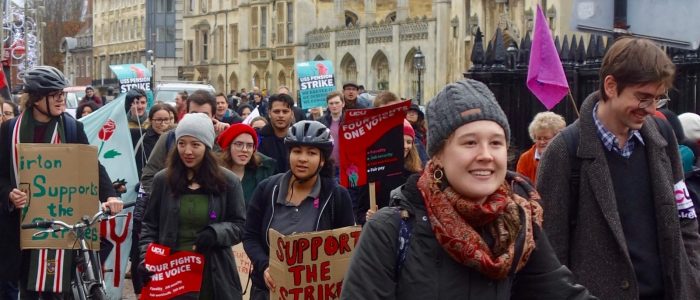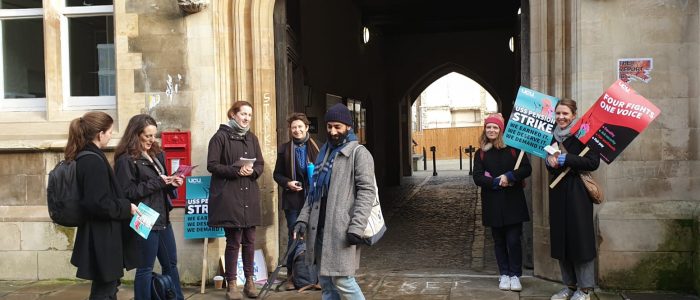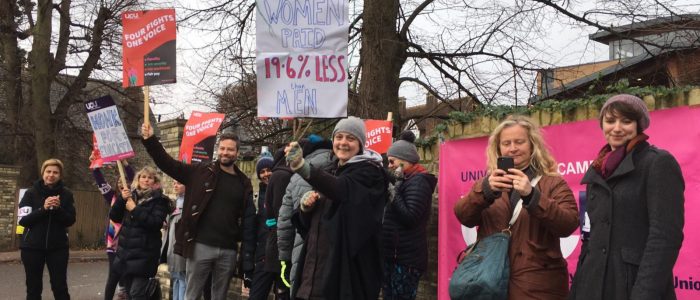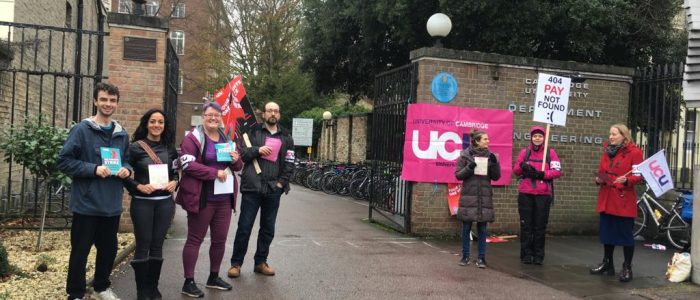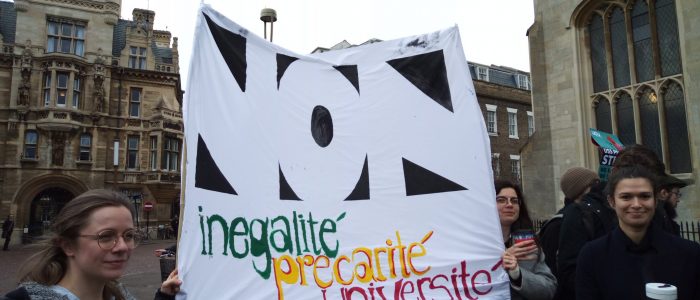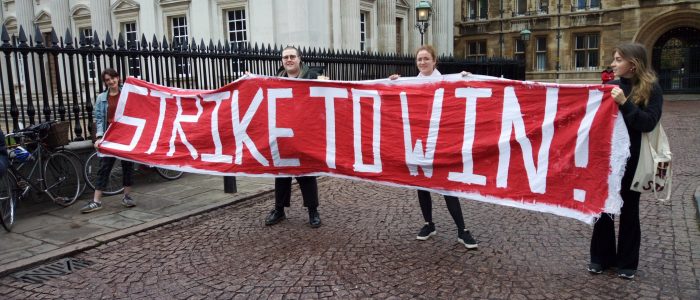Share Your #StrikeStories
We’re collecting stories from across the university staff and students about why they’re striking or supporting the strikes. Whether it’s worry about your pension, anxiety about your job prospects, or exhausting workloads – we want to hear your voice and your #StrikeStories. Share your experiences (either anonymously or not) using this form.
Strike 2020: Dispatch from the Flying Anti-Casualisation Picket
These are just a few of dozens of our members who spoke with our flying anti-casualisation picket on the first day of our 2020 strike.
Over the course of our conversations, some things became apparent. We all agree that striking isn’t easy. It’s a lot of work. And it’s a financial burden (something the hardship fund can help soften). But many of us – especially those at the most casualised end of the spectrum – fear that we can’t afford not to strike. We can’t afford to keep planning our lives one year at a time; to support ourselves and our families on nine-month contracts; to see our mental health decline as we perform unpaid work with little certainty about what the future holds.
The question for many of us isn’t ‘strike or don’t strike’; it’s ‘strike or leave academia.’
Striking isn’t easy, but it also breaks down the isolation and hopelessness that so many of us feel. And it gets results! Since we’ve gone on strike and delivered nearly one thousand anti-casulisation pledges to the Cambridge administration, H.R. finally recognised casualisation as a reality at this university. H.R. is now considering giving contracts to hourly-paid teachers and is reviewing the fixed-term contracts of staff who (as most of us already know) perform indispensable work for the university.
We need to make those H.R. promises a reality — one that will materially affect the lives of nearly one thousand people at Cambridge. We are counting on each other to show up for this strike and keep the pressure on. Another university is not only possible but necessary.
Vice Chancellor Stephen Toope: Which Side Are You On?
“… In this scheme such things as ethnic and gender pay gaps are not unfortunate and incidental but constitutive of the workings of a system that is not only fundamentally exploitative but requires us to exist in atomised constituencies, pitting our causes against each other. We have to see through this. Remind ourselves to see through this anew everyday and join forces. What does this mean for us as union members and students in solidarity with the strike? First of all, we have to reject, as we have, not only pay gaps and pension detriments, which we know to effect women and ethnic minorities and the disabled and the unwell disproportionately, but also that we refuse to act as border guards. We are teachers, not guards, and our understanding of teaching and learning is that the production and fostering of knowledge is fundamentally global in scope and always has been. Knowledge cannot accept segregation, line drawing, seclusion, separation and surveillance. We do not accept the hostile environment. Knowledge cannot flourish in a hostile environment. This environment has seen not just some of our best researchers and colleagues isolated and targeted but made life incredibly difficult for those who are here on work permits and student visas, denying them that most fundamental of rights: the right to protest and assert critical dissent …”
— Dr. Priyamvada Gopal speaks at the rally against racism at Cambridge
The second week of our strike is focused on equality. We are striking to hold our leaders accountable for the unnecessary and unacceptable inequality that exists at Cambridge and in our sector.
Why is it that Cambridge’s gender pay gap is 19.6%– which is about 8% higher than the average in our sector – and why is it even higher for BME staff? Why is it that only 23% of Professors at Cambridge are women and when will the University release its data on pay gaps for BME and disabled staff? Why does Cambridge lag so far behind its peers in paid parental leave and why has the University H.R. committee sat for nearly a year on a proposal to rectify this problem?
Why is it that – unlike many of its peers –Cambridge doesn’t cover the visa costs of our international students and staff, which for many amount to a month’s worth of pay? If the University is truly committed to promoting diversity and inclusion, why does it maintain close relationships with arms and tech companies like Palantir, which provides the tools to surveil, criminalise and detain migrant and minority communities?
Vice Chancellor Stephen Toope asks us to trust that he takes these issues very seriously. But actions speak much louder than words, and to determine how seriously the University takes inequality, we only need to look at the realities of our working conditions. Toope’s recent e-mail to staff is full of sympathetic words and euphemisms (pay ‘rises’ that ‘struggle to keep pace with inflation’ are in fact pay cuts) but it contains very little transparency about how, exactly, the University plans to address the problems of inequality, marketisation and casualisation. Pay disparities have barely budged at Cambridge in the last five years, while Vice Chancellor salaries continue to rise: Stephen Toope is now the second-highest paid VC in the UK, with an annual remuneration of £492,000.
This means that we need both action and much more transparency about what the University will do to address our concerns.
CUCU’s exec committee has therefore written a response to Toope, calling on him to craft a public statement that details, among other things, how he plans to respond now that UCEA has come to the bargaining table; when Cambridge will release its data on pay gaps for BME and disabled staff; whether he still endorses the recommendations of the Joint Expert Panel’s first report; when the University will accept the demands of our Raise the Bar campaign; and what, specifically, the University will do to close its absurd pay gaps. Finally, if Toope claims to be “working with UCU,” why is it that – unlike many, many of its peers – Cambridge refuses to formally recognise our union?
Our work makes Cambridge work, and we cannot do our work properly when the University fails to show us this respect and make a transparent commitment to fairness and equality.
Climate Strike: 29 November
Day 5 of UCU’s eight-day strike coincided with the latest Global Climate Strike, spearheaded by Greta Thunberg and other young activists. Millions of pupils have walked out of their schools around the world, calling on their governments to take action over climate change.
Across the country, striking UCU branches themed their pickets and broader activities around the climate crisis. In Cambridge, placards on picket lines bore such slogans as “Striking for planet, pay and pensions!” and “Want climate justice? Join this climate strike!”.
Students and workers renewed long-running calls for the university to divest from fossil fuels. The university’s recent acceptance of a £6 million donation from Shell for research into new oil extraction technology received especially wide and vocal criticism.
On some pickets, CUCU members spoke about the importance of organised labour as a collective agent for a just transition to a low-carbon society. They discussed such examples from labour history as the 1976 Lucas Plan, which outlined how Lucas Aerospace workers, who were being made redundant, could use their skills to create socially useful technologies instead, and the “green bans” of the Builders Labourers Federation in Australia during the 1970s, under which union members refused to perform construction work that failed to meet environmental standards.
Picketing drew to a slightly earlier close so that UCU members could join the climate strikers in town. They amassed at a rally on King’s Parade, where the crowd heard speakers from the youth strike, CUCU, CUSU, and other groups. Memorably, Billy Bragg returned to speak and give another energizing musical performance, as he did on Wednesday in solidarity with the UCU. This time, Bragg stressed the necessity of connecting the labour and environmentalist movements.
Meanwhile, local Extinction Rebellion activists performed direct actions at multiple locations in Cambridge to highlight the climate crisis.
Later in the afternoon, an assembly at Great St. Mary’s continued the discussion of climate justice and the university. After hearing from a panel of speakers based at Cambridge and Anglia Ruskin, the teach-out split into groups to discuss the role of the university in the face of the global climate emergency and what steps we can take to tackle the crisis here in Cambridge. A commitment to stand in solidarity with our intersecting movements and to hold our institutions to account were major orders of the day.
On the Picket Line: Anti-Casualisation Day
UCU members describe the stakes of the strike for casualised staff:
“I’m on strike for my PhD students and my postdocs. There are issues of pay, issues about pensions, but the most important issue is about casualization of our entire sector: the ways in which all of the new jobs created are just part-time – one year here, six months there, two years there. Our younger academics can’t actually form a life around that. They can’t settle in a place, have family and children, if you’re constantly uprooting yourself to go from place to place. It’s absolutely horrible. This is the sort of university that we’re becoming, not just Cambridge but the whole sector. It is enormously problematic, and that is why we need to go on strike. It is enormously important for the next generation. It’s not just about mid-career academics. Actually the most important thing is the younger people coming up because we’re creating a structure for them which is impossible to stay in and have a long-term career.”
–Mia Gray, Department of Geography
This strike confirms what many of us already knew: casualisation is a serious concern at Cambridge. Over the past year, CUCU’s anti-casualisation campaign has collected nearly 1000 pledges to Raise the Bar for casualised staff, including hourly-paid teachers, Temporary Employment Service workers, graduate workers, and early career staff. We demand decent contracts; fair pay; rights at work; respect for grad workers; and the fair allocation of teaching.
On day four of our strike, hundreds turned out to stand against casualisation, with members on permanent and open-ended contracts standing in solidarity with colleagues at the sharp end of precarity. The anti-casualisation rally featured powerful speeches from our casualised members, who described what it means to work without a contract or on a zero-hours contract; to lack access to family and medical leave; to be dependent on the goodwill of a supervisor; to feel enormous pressure to say ‘yes’ to every request for extra work. This is an unsustainable model that forces many of us to face financial and personal hardship or leave the sector. After hearing stories of our struggles and messages of solidarity, we marched together to deliver nearly 1000 Raise the Bar pledges to Cambridge’s H.R. Division. An H.R. rep refused to come outside, so we left our pledges in the letterbox and chanted loudly enough to make our message heard: we demand to Raise the Bar for casualised workers.
“We deserve a fair pension, and so do other workers.”
CUCU rep. Daniel Weiss (Faculty of Divinity) explains the origins of the pensions conflict and why the UCU has been pushed (again) to take industrial action:
Let me begin with some lines from the songwriter U. Utah Phillips. You can listen out for the word ‘pension’ in these verses.
I spent my whole life making somebody rich
I busted my ass for that son of a bitch
And he left me to die like a dog in a ditch
And he told me I’m all used up
He used up my labor, he used up my time
He plundered my body and squandered my mind
And gave me a pension of handouts and wine
And told me I’m all used up
Now, one reason we’re striking is because we don’t want a pension of handouts and wine – we want a fair pension. For many students here, a pension might seem far, far away, so let’s talk about some basics:
What is a fair pension about? How is it linked to justice? How can our fight for our pension here contribute to turning the tide for pension justice in the UK more widely? How can we change things so that future generations – including ourselves – are able to receive a fair pension?
A pension is a form of deferred wages. We say to our employers: we’ll let you delay paying us part of our earned salary now, and instead you can pay it to us after we retire. This way, we can still have a decent life after we get older and we’re no longer as capable of work.
So, first key point: basic dignity for the elderly should be treated as a given by a decent society, not something that requires painful struggle in the cold and wet.
When the employers then come along and say: we’ve decided to cut your pension, this is them saying: we’ve decided to cut your previously-agreed pay. Are we going to let them just waltz up and do that?
Over the past decades in the UK, we’ve seen many Defined Benefit pension plans, which offered a guaranteed pension upon retirement in proportion to the number of years worked, replaced by inferior Defined Contribution schemes, where the amount you receive upon retirement is dependent on the risky ups and downs of the stock market. In practice, this shift has meant that many people in the UK have a significantly worse situation in their retirement age now than in the past.
Workers in UK universities also had been fortunate to have a decent pension plan. But this has been reduced bit by bit over the past ten years. Then, in the beginning of 2018, the university employers said: we’re now turning your Defined Benefit scheme into Defined Contribution. Sorry about that, and good luck in retirement!
At that point, the UCU members across the country stood up and said: NO!
The employers said: sorry, there’s a huge deficit in the pension funding scheme, and we need to cut the pensions. These are just the ‘financial realities’.
But UCU said to the employers: no, we’ve looked at the data, and the way that the pension scheme is being calculated is, in layman’s terms, ‘totally messed up’. The claimed deficit has been grossly overestimated, and in fact the scheme is in good health. Please, let’s sit down and look at the numbers together.
The employers said: sorry, we refuse to sit down and look at it with you. We just know that it needs to be cut – so take a hike!
UCU said: no, we’ll take a strike!
So we struck. And, only after striking did the employers agree to set up a Joint Experts Panel, with pensions experts nominated by UCU and by the employers. And, when the JEP reported in September 2018, they concluded unanimously: the scheme is in good health, and the major cuts are not needed!
So UCU was vindicated, and it taught us: we wanted to examine the scheme in an evidenced-based way, but it took strike action to get the employers to even agree to look at the actual reality. They had been making claims about ‘financial realities’, but it turned out they were refusing to look at the actual realities. So, sometimes employers need the force of strike action to even start to look at things based on actual evidence. We can’t necessarily trust what they tell us, and can’t assume they’re properly attuned to evidence-based reality. A scary thought, but one we need to take to heart.
But, why are we back here again in 2019, still striking over USS? We were able to preserve defined benefits. However, the main JEP recommendations have not been applied, and the scheme is still being calculated by the same problematic valuation methodology. So, now they’re saying: you need to put in higher contributions – in real terms, another pay cut. So again, they are still out to undermine the pension scheme, now by making it unaffordable in terms of the payments required. So now we’re forced to strike again to tell them: get it right this time! We already saw from the JEP that the scheme is fine – now you still need to actually implement it!
You here today should be angry that our pensions are being mismanaged, and that we’ve been told to just accept it. So we’re fighting here today, but here is a key point to keep in mind: the trend of undermining Defined Benefit pensions across the country had previously been succeeding in horrifying ways – and the UCU strike was one of the few instances of stopping a Defined Benefit scheme from being closed. We took a stand against the employers’ false claims, and in doing so can set a precedent for workers in other sectors. We deserve a fair pension, and so do other workers. We will fight until we win, and when we do, we’ll stand in solidarity with others who are also fighting against the false claims of their employers.
And, we’ll also enact a lesson for our students, in relation to their university education, that they also don’t need to accept the false claims of those in power just because they say so.
So, keep the pickets going, keep your anger strong, and don’t let fake claims undermine our just commitment to a decent retirement, fair pay, and fair conditions.
On the Picket Line: 27 November
Why are you on strike?
“Firstly, I’m on strike because I’m a member of the union, and the union has voted to be on strike. As far as I’m concerned, that’s what you do. It’s what unions do. Secondly, I did actually vote for the strike because I think that all of the things we’re fighting on are very important. People in the university are very much overworked. Graduates and post-docs are doing very casualised teaching. The whole foundation of the supervision system is held up by people on hourly paid contracts who are not necessarily being paid for any of the preparation work they’re doing. They do it because it helps their career and because it’s the right thing to do, but they still should be paid for it properly. Work needs to be not casualised because people need to be able to live. Pay needs to keep up with inflation rather than falling behind. Pensions, which are deferred pay, need to be able to support us in the future. The USS board of trustees is simply ignoring the first report of the Joint Expert Panel and saying they’re going to wait for the second report. It’s not good enough that they’re still going to make changes to our pensions. At this point they should take what the Joint Expert Panel said on board and actually do something with it. Our dispute is with the university but we need the university to go and negotiate on our behalf, with the UUK, with UCEA, to make sure that our demands on pay, pension, equality – the gender pay gap in this university is extreme, it’s ridiculous – and workload are heard. The only way to make sure we’re heard is to be here on the picket line.”
— Eleanor, IT staff in the Engineering Department
The strength of our voices and of strike action is already clear: yesterday, UCEA finally yielded to our requests to negotiate. UCU negotiators made it clear that members expect meaningful improvements on every part of the Pay and Equality claim, and UCEA have gone back to their member institutions for a written response. It is our collective action – and our power at the pickets – that brought UCEA to the bargaining table. Little wonder that some institutions (University of Birmingham) are attempting to restrict UCU members’ ability to picket. Birmingham, UCEA, and Cambridge Vice Chancellor Stephen Toope all understand that there is power in a union. (Click here to sign a petition on behalf of our fellow strikers at Birmingham.)
Already the strike has brought together not only students and staff but also prominent figures in struggles for a democratic society, from Ai Weiwei to Billy Bragg. Billy Bragg’s performance at King’s Parade reminded us that cynicism is our greatest enemy. But as Billy noted, the enormous solidarity shown in just the past few days proves that staff and students are not cynical: they care deeply about fairness, equality, and the future of higher education – and they are getting organized. In the words of our members: “the only way to make sure we’re heard is to be here on the picket line.”
Day One on the Picket: Whose University? Our University!
“There is no other opportunity that allows us to traverse the strictures of our present institutional logic at such scale – to set loose the question of what a university should be, and to assert that it should be ruled not for profit, but for a public good.
I know from experience that it can be difficult to do; the exceptional space of the strikes will end, bringing us back into the governance of institutional and market logics, to the tyrannical decisiveness of final grades and individual success. But the 2018 strikes have left their mark, and now in 2019 we have the opportunity to build on it. In any case, the continuous crisis of ‘business as usual’ means student life in the absence of any strikes is hard already, particularly for working class and other marginalised students, and will only get harder for more people if we are unable to drastically reimagine it.”
— Siyang Wei, Cambridge MPhil, in Varsity, November 22, 2019
